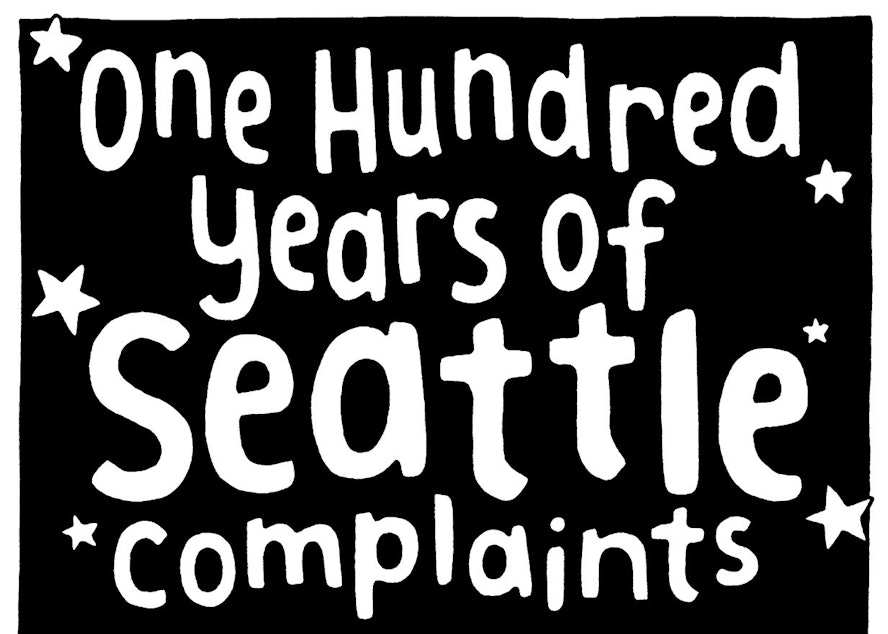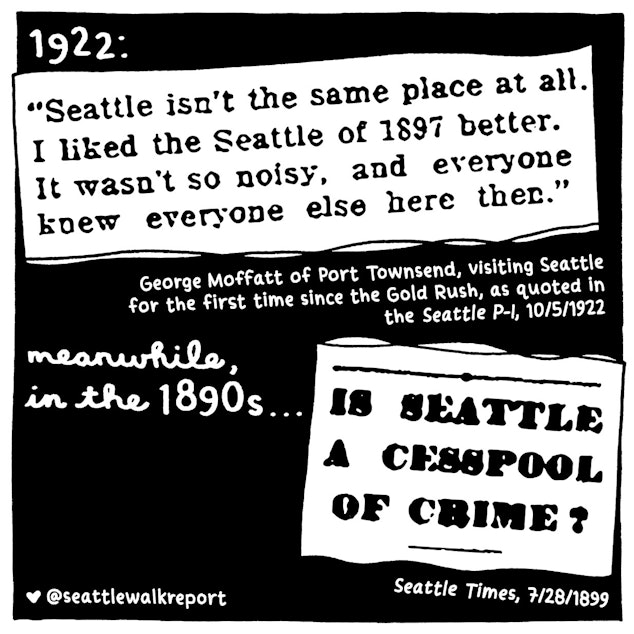Seattle 'ain't what it used to be.' 100 years of grouchy complaints

Susanna Ryan, author of the Seattle Walk Report, takes pride in her archive filled with clippings of complaints. The trove of gripes with the Pacific Northwestern city dates back to 1890.
“One of my favorite pastimes is curling up with a big ol’ mug of tea and using my Seattle Public Library card to access the Seattle Times historical database, a digital archive of the newspaper from 1895 to the present day,” Ryan says.
Sifting through the database, Ryan found many of the complaints seemed as though they could be recent.
“I was surprised at just how often something I was reading felt like it could've been written yesterday, whether it was published in 1910 or 1970.”
Issues of affordable housing, city development, or variations of the Seattle Freeze are almost timeless.
Complainers of yore missed the “old Seattle,” be it 1897 or 1988. The older, but better Seattle in their eyes has an ever changing date and time.
Sponsored
Ryan saves articles and letters to the editor in a folder titled “Seattle complaints.” She says that overtime, the compilation painted a humorous portrait of the city and city life in general.
“The one constant in Seattle are the complaints about Seattle,” she says.

Knute “Mossback” Berger, Crosscut’s editor-at-large, has spent many hours with the city’s archives as well. Berger tracks has written about the history and culture in his books “Pugetopolis” and “Space Needle, Spirit of Seattle.” Like Susanna Ryan, Berger sees a common thread through these complaints.
“'The city ain’t what it used to be,' is a chronic complaint,” Berger says. “It’s true. The city is never what it used to be no matter when you lived here.”
Sponsored
Complainers of yore missed the “old Seattle,” be it 1897 or 1988. The older, but better Seattle in their eyes has an ever changing date and time.
Ryan saves articles and letters to the editor in a folder titled “Seattle complaints.” She says that overtime, the compilation painted a humorous portrait of the city and city life in general.
“The one constant in Seattle are the complaints about Seattle,” she says.
Knute “Mossback” Berger, Crosscut’s editor-at-large, has spent many hours with the city’s archives as well. Berger tracks has written about the history and culture in his books “Pugetopolis” and “Space Needle, Spirit of Seattle.” Like Susanna Ryan, Berger sees a common thread through these complaints.

Sponsored
“'The city ain’t what it used to be,' is a chronic complaint,” Berger says. “It’s true. The city is never what it used to be no matter when you lived here.”
The century’s worth of complaints also come with a strong Jeffersonian hatred for living in the bustling city, a life away from agrarian individualism. Knute Berger puts this in a context of bungalow living. He says we’ve shifted to a different version of that, one with more communal living, density, high rises, and P-patches.
“We still have a foot in the old bungalow city and another in a much more dynamic, denser and more diverse city,” he says. This explains the current imbalance in our politics and what people want from the city today, he says.
Knute sees Seattleites as strong proponents of change, but nervous about the way in which it’s enacted.
Sponsored
In the past year, issues of social equity, racial justice, homelessness, crime, revitalizing downtown have been pushed further to the forefront. It’s created tensions, inspired election bids, and strong mutual aid efforts.
Change is probably on everyone’s list of things that need to happen, he says. However, we are not on the same page about what political process will bring about the best change.

Gaps of 10 years, 20 years, or 100 years go by and the compilation of complaints boost a narrative of a forever dying —a city plagued by trash and candy sacks or unfriendly neighbors or new technological noises.
Sponsored
Susanna Ryan says that this perspective illustrates a constantly growing and evolving place. She figures in another 25 years people growing up in the city today will have had a certain fondness that will have since faded.
“I know that people will be nostalgic for ‘these days,’ 'cause that’s just what happens.”




